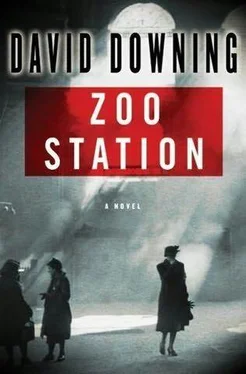David Downing - Zero Station
Здесь есть возможность читать онлайн «David Downing - Zero Station» весь текст электронной книги совершенно бесплатно (целиком полную версию без сокращений). В некоторых случаях можно слушать аудио, скачать через торрент в формате fb2 и присутствует краткое содержание. Жанр: Шпионский детектив, на английском языке. Описание произведения, (предисловие) а так же отзывы посетителей доступны на портале библиотеки ЛибКат.
- Название:Zero Station
- Автор:
- Жанр:
- Год:неизвестен
- ISBN:нет данных
- Рейтинг книги:5 / 5. Голосов: 1
-
Избранное:Добавить в избранное
- Отзывы:
-
Ваша оценка:
- 100
- 1
- 2
- 3
- 4
- 5
Zero Station: краткое содержание, описание и аннотация
Предлагаем к чтению аннотацию, описание, краткое содержание или предисловие (зависит от того, что написал сам автор книги «Zero Station»). Если вы не нашли необходимую информацию о книге — напишите в комментариях, мы постараемся отыскать её.
Zero Station — читать онлайн бесплатно полную книгу (весь текст) целиком
Ниже представлен текст книги, разбитый по страницам. Система сохранения места последней прочитанной страницы, позволяет с удобством читать онлайн бесплатно книгу «Zero Station», без необходимости каждый раз заново искать на чём Вы остановились. Поставьте закладку, и сможете в любой момент перейти на страницу, на которой закончили чтение.
Интервал:
Закладка:
Russell shrugged. “Several reasons. All freelance journalists are always looking to place stories with whoever will buy them. And it occurred to me that the Soviets might be interested in a fresh look at National Socialist Germany, one that concentrates on what the two societies have in common, rather than what divides them. What I-”
Kleist stopped him with a raised hand. “Why did you think this would interest the Soviets?”
Russell took his time. “Soviet propaganda has generally been very hostile toward the Reich,” he began. “And by taking this course, they have backed themselves into a corner. There’s no doubt that Germany is the rising power in Europe, and the Soviets-like everyone else-will sooner or later have to deal with that reality. But as things stand at the moment, their own people would not understand a more… a more accommodating attitude toward the Reich. The articles I propose would prepare the ground, so to speak. They would help in restoring the Soviet government’s freedom of movement, allow them to act in concert with the Reich if and when the two states’ interests coincide.”
Kleist looked thoughtful.
“And I see such articles as a contribution to peace,” Russell went on, hoping he wasn’t over-egging the pudding. “I fought in the last war, and I have no desire to see another. If nations and governments understand each other, there’s less chance we’ll all blunder into one.”
Kleist smiled. “I don’t think there’s much chance of the Fьhrer blundering into anything,” he said. “But I take your point. And we have no objection to your articles, subject to certain conditions. These are sensitive subjects-I’m sure you’d agree. And while you are English, you are also living in the Reich under our protection. Your views would not be seen as official views, but they would be seen as views we are prepared to tolerate. You understand me? Whatever you write could be construed as having our blessing.”
Russell felt anxious for the first time. “Yes…” he said hesitantly.
“So, you see, it follows that we cannot permit you to write anything that we violently disagree with. Your articles will have to be pre-submitted for our approval. I am sure,” he added, “that this will only be a formality.”
Russell thought quickly. Should he at least recognize the implied dismissal of his journalistic integrity, or just play the cynic? He opted for the practical approach. “This is unusual, but I see your point,” he said. “And I have no objection, provided that your office can approve-or disapprove-the articles quickly. The first one is due in a couple of weeks, and at fortnightly intervals after that-so, a couple of days…”
“That will not be a problem. Nothing gathers dust here.”
Kleist looked pleased, and Russell had the sudden realization that the SD were as eager to see these articles as Shchepkin and his people. He decided to go for broke. “Sturmbannfьhrer, could I make a request? In order to write these articles I shall need to travel a great deal around the Reich, and talk to a lot of people. I shall be asking them questions which they may find suspicious, coming, as they will, from a foreigner. A letter from this office confirming my credentials, and stating that I have permission to ask such questions, would be very useful. It would save a lot of time talking to local officials, and might help me avoid all sorts of time-consuming difficulties.”
Kleist looked momentarily off-balance-this was not in his script-but he soon recovered. He scratched his cheek and rearranged his hair again before answering. “That seems a reasonable request,” he said, “but I’ll have to consult with my superiors before issuing such a letter.” He looked down at his pen, as if imagining the pleasure of writing it out.
“Is there anything else?” Russell asked.
“Just one thing. Your business with the Soviets-you are conducting it by post, I presume?”
“So far,” Russell agreed, hoping to God that Kleist knew nothing of his meeting with Shchepkin. “Though of course I may have to use the phone or the wire service at some point.”
“Mm. Let me be frank with you, Mr. Russell. If, in the course of your dealings with the Soviets, you learn anything of their intentions, their capabilities, we would expect you to pass such information on.”
“You’re asking me to spy for you?”
“No, not as such. Mr. Russell, you’ve lived in Germany for many years…”
“Almost fourteen.”
“Exactly. Your son is a German boy, a proud member of the Hitler Youth, I believe.”
“He is.”
“So presumably you feel a certain loyalty to the Reich.”
“I feel affection, and gratitude. I am not a great believer in loyalty to countries or governments.”
“Ah, you were a communist once, I believe.”
“Yes, but so was Mussolini. A lot of people were in the early Nineteen-twenties. Like Mussolini, I got over it. My loyalty or lack of it… Sturmbannfьhrer, what would you think of a German who, after a decade spent in England, proclaimed his loyalty to the English King? I suspect you would consider him a traitor to the Fatherland.”
“I…”
“I have a German son,” Russell ploughed on. “I have an American mother, and I had an English father. I was brought up in England. Insofar as I am able, I am loyal to all three countries.”
“But not to the Soviets?”
“No.”
“So if a Soviet contact told you of a threat to the Reich, you would not keep it to yourself.”
“I would not.”
“Very well. Then I think our business is concluded.” Kleist stood up and offered his hand across the desk. “If you get the articles to me, either by hand or post, I will guarantee to return them within twenty-four hours. Will that suffice?”
“It will.”
“Then good day to you. Fraulein Lange will see you back to the entrance.”
She did. Russell followed the clicking heels once more, picked up his coat from the smiling receptionist, and found himself out on the Wilhelmstrasse pavement. It was dark. In more ways than one.
Tuesday was clear and cold. Walking down to the U-bahn at Hallesches Tor, Russell was more conscious of the icy wind from the east than any theoretical warmth from the sun. At the studio in Neukцlln he waited while Zembski shouted at someone through the phone, and then persuaded the Silesian to develop his film that day. Back at the U-bahn station he bought the Tageblatt and Allgemeine Zeitung at a kiosk and skimmed through their accounts of the Chancellery opening as he waited for a train. As far as he could tell, he’d seen all there was to see.
The only other items of interest were the imminent departure of Reichsbank President Schacht, the Danzig stamp row-which had finally reached the German nationals-and the unsurprising news that US government spokesmen were less than impressed by the Nazis’ latest idea of sending all the Jews to either Manchuria or Alaska.
Back at Neuenburgerstrasse Russell settled down to work. If you had a green light from the SD, he noted cynically, it probably paid to get moving. First off, he needed a list of topics for Pravda. What was so great about Nazi Germany if you didn’t like flags and blood in the gutter? Full employment, for one. A national sense of well-being. Worker’s benefits, up to a point. Cheap organized leisure activities-sport, culture, travel. All these came at a cost, and only, needless to say, to Aryans, but there was something there. As an English advertising man had once told him, there had to be something in the product that was worth having.
What else? Health care was pretty good for the curable. And transport-the rocket trains, the autobahns and the people’s car, the new flying-boats and aeroplanes. The Nazis loved modernity when it speeded things up or made them simpler, hated it when it complicated things, or made it harder for them to live in their medieval mind-set. Einstein being Jewish was most convenient.
Читать дальшеИнтервал:
Закладка:
Похожие книги на «Zero Station»
Представляем Вашему вниманию похожие книги на «Zero Station» списком для выбора. Мы отобрали схожую по названию и смыслу литературу в надежде предоставить читателям больше вариантов отыскать новые, интересные, ещё непрочитанные произведения.
Обсуждение, отзывы о книге «Zero Station» и просто собственные мнения читателей. Оставьте ваши комментарии, напишите, что Вы думаете о произведении, его смысле или главных героях. Укажите что конкретно понравилось, а что нет, и почему Вы так считаете.












